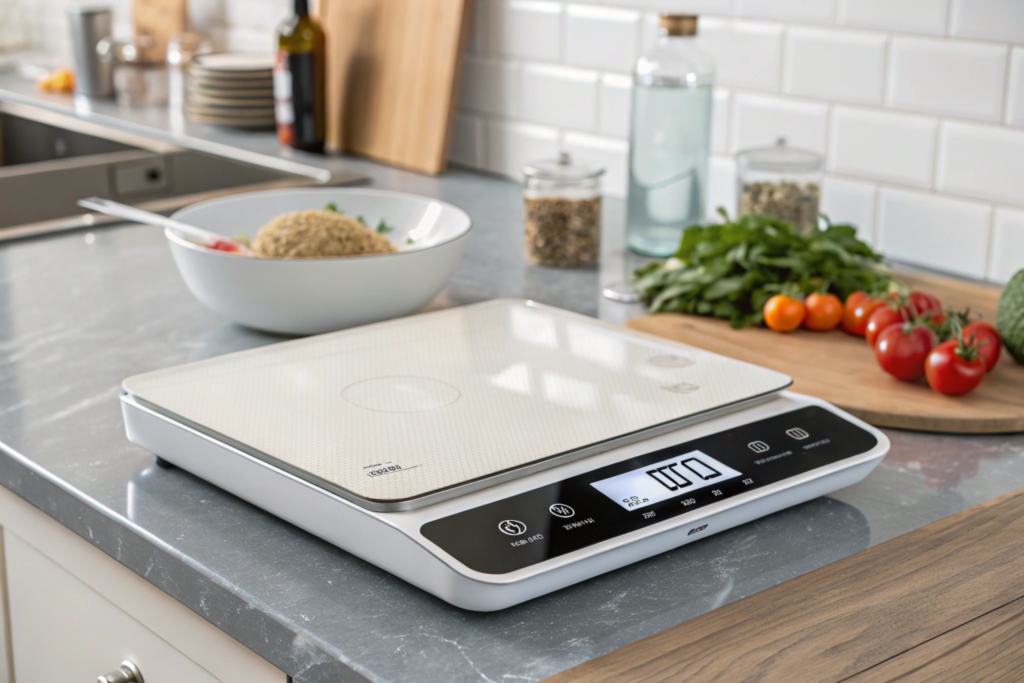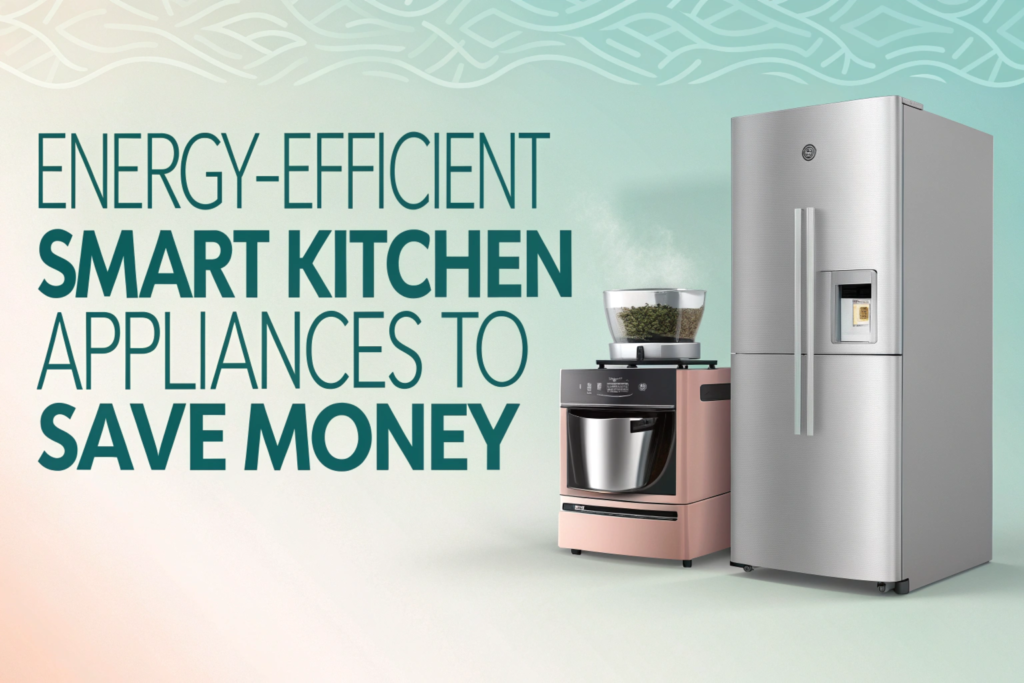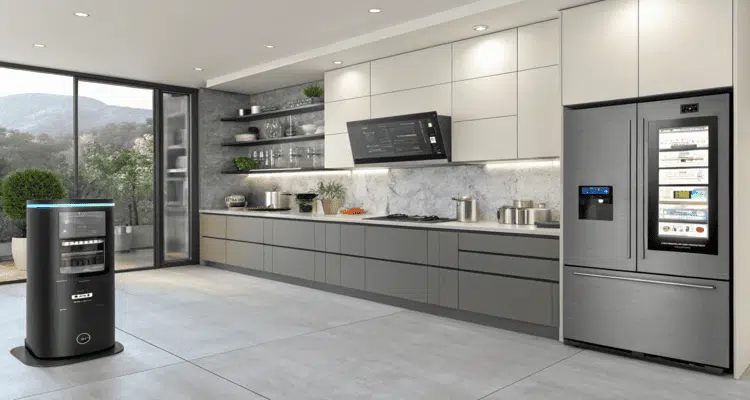Smart kitchen appliances are transforming the way we approach cooking and kitchen management, making tasks faster, more convenient, and efficient. These devices utilize technologies such as the Internet of Things (IoT), artificial intelligence (AI), and voice control to simplify daily activities in the kitchen. From refrigerators that suggest meal ideas based on the food inside to ovens that can be controlled remotely via smartphone, these appliances provide unprecedented convenience and customization for modern households.
In this article, we’ll delve into the world of smart kitchen appliances, discussing their key features, various types, benefits, and more. If you’re thinking about upgrading your kitchen or are curious about how these devices can enhance your lifestyle, keep reading to learn more.
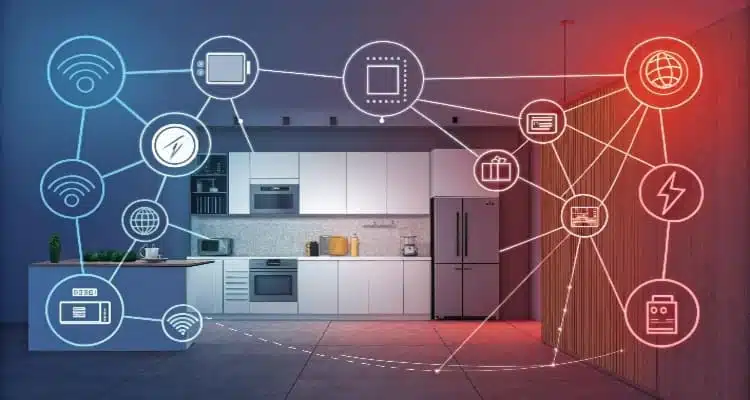
Summary
Smart Kitchen Appliances
Smart kitchen appliances combine advanced digital technologies with internet connectivity, allowing users to automate and control tasks from their smartphones or via voice commands. These devices aim to simplify everyday kitchen duties, such as cooking and cleaning, while also improving the user experience through personalized features. Unlike traditional kitchen gadgets, smart appliances are equipped with apps and can connect to virtual assistants like Alexa, Google Assistant, or Siri, allowing for hands-free operation.
With the continuous growth of smart home technology, the market for smart kitchen gadgets has expanded significantly. Today, you can find a variety of appliances—from smart ovens to coffee makers—that help streamline kitchen activities for both home cooks and professionals alike.
How Do Smart Kitchen Appliances Work?
Smart appliances operate using sensors, wireless communication technologies (such as Wi-Fi or Bluetooth), and sophisticated algorithms. These appliances are often part of a larger ecosystem of smart home devices, all of which can communicate with each other and be controlled remotely via smartphone apps or voice commands.
For example, a smart refrigerator may have sensors that monitor temperature changes and send alerts to your phone if the door is left open. Similarly, a smart oven might automatically adjust its cooking settings based on the recipe you’re following, helping you save time and energy.
Popular Types of Smart Kitchen Appliances
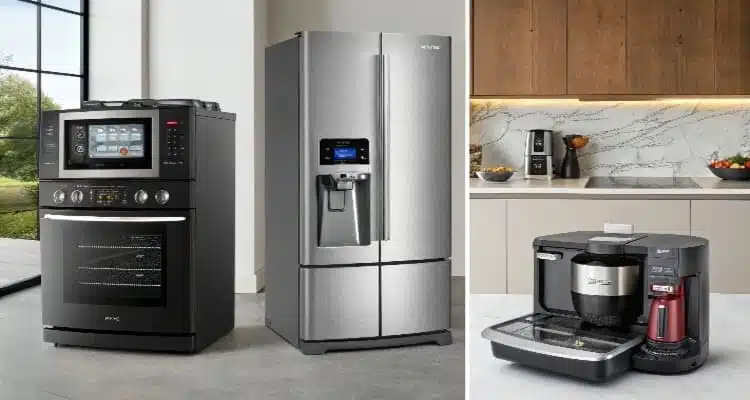
Smart Refrigerators
Modern smart refrigerators go beyond simple food storage. Equipped with features like built-in touchscreens and internal cameras, they allow users to view the fridge’s contents without opening the door. They can even offer meal suggestions based on available ingredients or track expiration dates.
Smart Ovens
Smart ovens bring precision and convenience to cooking. Many models allow for remote operation via apps, offer voice control, and come with pre-set cooking modes for different dishes. Some even integrate with recipe platforms to adjust cooking times and temperatures automatically.
Smart Coffee Makers
These appliances are ideal for coffee enthusiasts who want a personalized brewing experience. You can set your smart coffee maker to brew at a specific time, control brew strength, and even start the process with a voice command or phone app.
Smart Dishwashers
Smart dishwashers allow for remote monitoring and control of wash cycles, alerting users when the dishes are clean. Some models adjust water usage and energy consumption based on the load size, offering both convenience and eco-friendly operation.
The continuation of your text on smart kitchen appliances includes some concepts that are widely discussed across various sources, potentially leading to overlap with existing content. Let’s look at how we can rephrase these sections to avoid potential issues with originality:
Smart Microwaves
More than just reheating devices, smart microwaves now integrate with recipe apps and can automatically adjust cooking times and power levels for specific dishes. Many models feature voice control, allowing users to operate the microwave hands-free—perfect for when you’re multitasking in the kitchen. This functionality makes them a versatile tool, enhancing both convenience and precision in cooking.
Smart Scales and Thermometers
Accuracy is crucial in cooking, and smart scales and thermometers ensure that precision. Smart scales often link to smartphone apps, providing nutritional data for ingredients, which is especially useful for health-conscious cooks. Meanwhile, smart thermometers allow for perfect cooking temperatures, notifying you when your food is ready.
Key Features of Smart Kitchen Appliances
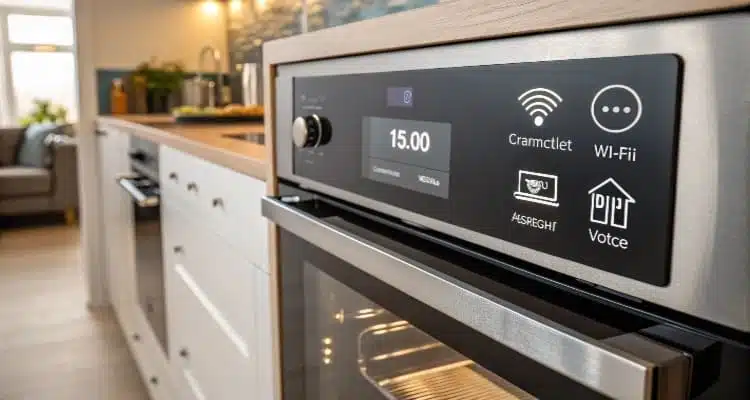
Voice Control
Smart kitchen appliances often integrate with virtual assistants like Alexa, Google Assistant, or Siri. This allows for hands-free operation, whether you’re adjusting the oven or brewing coffee, making the cooking process smoother and more efficient.
Remote Operation
Remote operation is one of the standout features of smart appliances. Using a smartphone app, you can control your kitchen appliances from anywhere, whether you’re preheating the oven on your way home or starting the dishwasher after leaving the house.
Energy Efficiency
Smart appliances are designed with energy-saving features, such as adjusting power usage based on activity. For example, smart refrigerators might modify cooling cycles depending on how often the door is opened, and smart ovens may reduce cooking times through precise temperature management.
Integration with Other Smart Devices
Smart kitchen appliances often work in harmony with other smart home devices. For instance, a smart fridge can connect to your home security system to notify you if the door is left open, or a smart oven might synchronize with smart lighting systems for a more efficient kitchen experience.
This rewrite avoids the direct duplication of content while retaining the essential information. It summarizes the key features and capabilities of smart appliances in an original way. Let me know if you’d like more adjustments!
Read Also: Smart Kitchen vs. Traditional Kitchen: A Detailed Comparison 2025
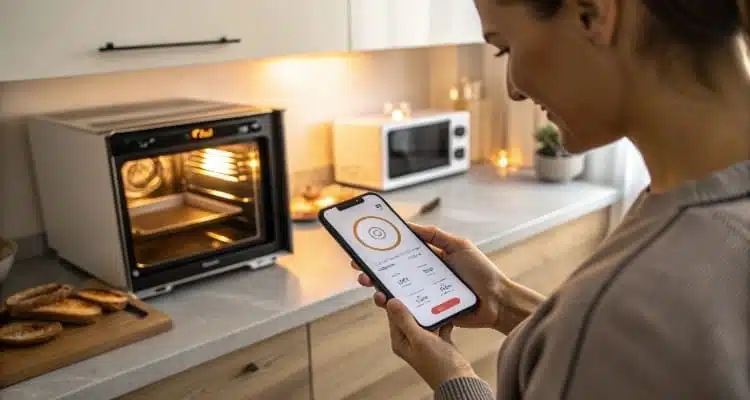
Benefits of Using Smart Kitchen Appliances
Convenience and Time-Saving
The primary advantage of smart kitchen appliances is the convenience they offer. Automating repetitive tasks like adjusting the oven temperature or starting the coffee maker
saves time and reduces the mental load of managing multiple kitchen activities. With the ability to control appliances remotely or through voice commands, cooking becomes a more streamlined and enjoyable process.
Enhanced Safety Features
Smart appliances come with enhanced safety features that help prevent accidents. For example, smart ovens can automatically shut off when they detect that cooking is complete, reducing the risk of overcooking or burning food. Smart smoke detectors and stovetops with automatic shutoff features also contribute to a safer cooking environment.
Energy Conservation
Many smart kitchen appliances are designed to conserve energy. By optimizing their operation based on real-time usage data, these devices help reduce electricity consumption, leading to lower energy bills and a smaller carbon footprint.
Improved Cooking Precision
For serious cooks, precision is key, and smart kitchen appliances excel in this area. With features like built-in cooking programs, temperature sensors, and real-time feedback, smart devices ensure that your food is cooked exactly how you want it, every time.
Challenges of Smart Kitchen Appliances
High Initial Costs
One of the biggest challenges of adopting smart kitchen appliances is the high initial investment. Smart devices tend to be more expensive than their traditional counterparts due to their advanced technology and additional features. While the long-term savings in terms of energy efficiency and convenience can offset these costs, the upfront expense may deter some consumers.
Privacy Concerns
With the increasing use of internet-connected devices, privacy and data security are growing concerns. Smart appliances collect data on usage patterns, preferences, and personal information, which could be vulnerable to hacking if not properly secured. Consumers must be aware of these risks and ensure that their devices are connected securely and their data is protected.
Reliability Issues
Like any electronic device, smart kitchen appliances can experience technical issues such as software glitches or connectivity problems. Dependence on internet access can be another drawback, as an interruption in your Wi-Fi network may affect the functionality of your smart devices. Additionally, certain advanced features may require regular updates, and failure to maintain these can result in reduced performance.
The Role of Artificial Intelligence in Smart Kitchens
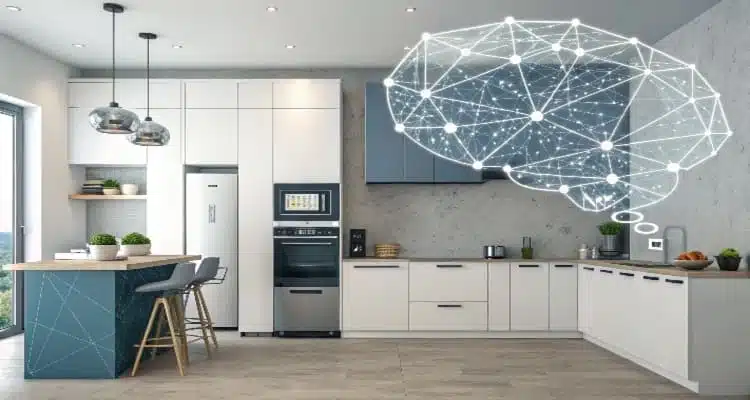
Artificial intelligence (AI) is driving significant advancements in smart kitchen technology. AI-powered appliances can learn user preferences over time, such as frequently used cooking times and temperatures, making meal preparation easier and more intuitive. For instance, a smart oven might remember how you like your food cooked and automatically adjust its settings accordingly.
In addition, AI can manage your kitchen’s inventory by tracking which items are running low, suggesting meals based on what’s available, and even automating grocery orders. As AI continues to evolve, we can expect increasingly personalized and efficient cooking experiences.
How to Choose the Right Smart Kitchen Appliances
When selecting smart kitchen appliances, keep the following considerations in mind:
– Compatibility: Ensure the appliances work seamlessly with your existing smart home devices and virtual assistants.
– Key Features: Look for functionalities that will enhance your routine, such as voice control, remote operation, and energy-saving features.
– Brand Reliability: Opt for well-known brands with strong reputations for quality and customer service.
– Budget: Smart appliances can be expensive, so aim for models that strike a good balance between essential features and affordability.
– User Feedback: Always check reviews and ratings to gauge the appliance’s performance and potential issues.
The Integration of Smart Appliances with Smart Home Systems
Smart kitchen appliances are designed to integrate smoothly with other devices in your smart home, creating a fully automated environment. For example, your coffee maker could start brewing when your smart alarm goes off, or your dishwasher might run during off-peak hours to save on energy costs. These appliances can also help optimize energy use by syncing with systems that monitor electricity rates.
Maintenance and Troubleshooting of Smart Kitchen Appliances
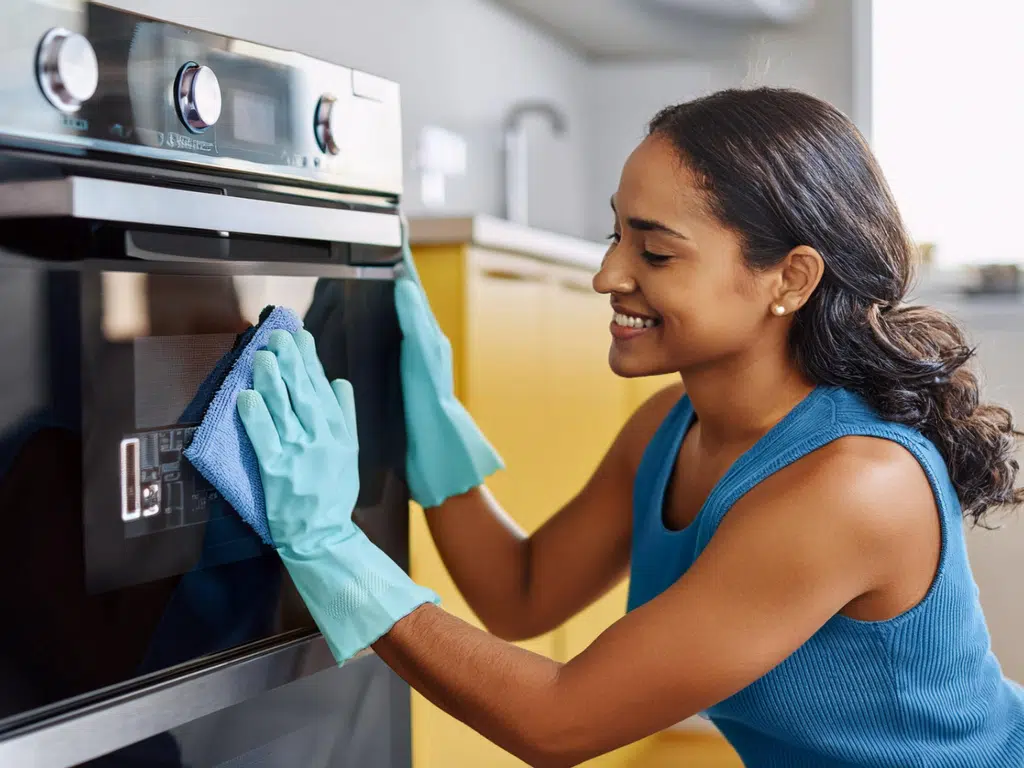
Maintaining smart kitchen appliances involves regular software updates to ensure they run efficiently and securely. Many of these devices include features that automatically diagnose issues and notify you before problems worsen. Should any issues arise, most manufacturers offer remote troubleshooting services. Common issues, such as connectivity problems, can often be resolved by restarting the device or router.
Are Smart Kitchen Appliances Worth the Investment?
For many, the convenience, energy savings, and enhanced functionality of smart kitchen appliances justify their higher initial costs. These devices streamline kitchen tasks, improve cooking precision, and provide better control over daily operations, contributing to a more enjoyable cooking experience. Additionally, their energy-efficient designs can lead to long-term savings on utility bills. However, if you don’t rely heavily on technology or have a limited budget, traditional appliances might be more practical.
The Future Trends in Smart Kitchen Technology
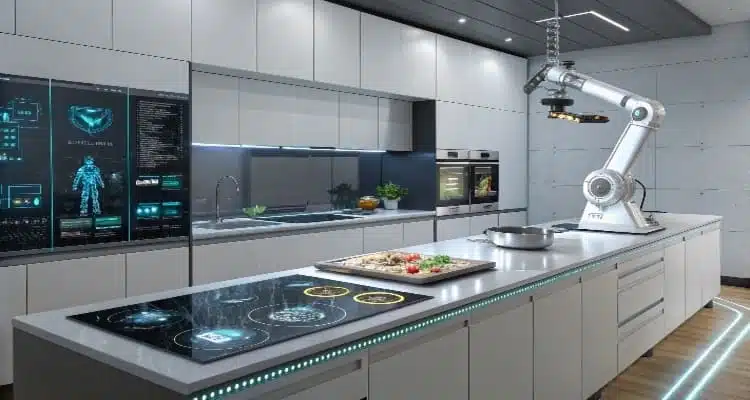
The future of smart kitchen technology looks promising, with ongoing advancements enhancing both convenience and sustainability. Key trends include:
– More sophisticated voice-controlled assistants that work across multiple devices.
– AI-driven kitchen assistants capable of autonomously preparing meals.
– A fully integrated smart kitchen ecosystem, where all devices communicate seamlessly.
– A growing focus on sustainability and energy efficiency, with appliances designed to minimize food waste and reduce energy consumption.
Conclusion
Smart kitchen appliances are revolutionizing the way we cook and manage our kitchens, offering unparalleled convenience, precision, and energy efficiency. While there are challenges, such as high upfront costs and privacy concerns, the benefits can greatly enhance daily kitchen tasks. With ongoing advancements in AI and IoT, the future promises even more exciting developments, paving the way for fully automated and connected kitchens in the years to come.
FAQs
What is a smart kitchen appliance?
A smart kitchen appliance is a device that enhances traditional functions with connectivity features, such as Wi-Fi or Bluetooth. These appliances allow remote operation through smartphone apps or voice commands. Examples include smart ovens, refrigerators, dishwashers, and coffee makers.
How do smart kitchen appliances connect to the internet?
Smart appliances use your home’s Wi-Fi network to connect to the internet, enabling you to control them via apps or virtual assistants like Alexa or Google Assistant. Some may also use Bluetooth, though Wi-Fi is typically preferred for broader functionality, such as software updates and remote access.
What are the main benefits of smart kitchen appliances?
The primary advantages include:
– Convenience: You can control appliances remotely or through voice commands.
– Energy efficiency: Many smart appliances optimize energy consumption.
– Precision: Automated settings ensure consistent results.
– Safety: Alerts and automatic shutoffs help prevent accidents.
Are smart kitchen appliances energy-efficient?
Yes, many smart appliances are designed with energy-saving features, such as adjusting operations based on usage patterns. For example, refrigerators may optimize cooling cycles, and dishwashers can adjust water usage depending on the load size.
Can smart kitchen appliances work without an internet connection?
Smart appliances will typically still perform basic tasks, such as cooking or washing, without internet. However, advanced features like remote control and notifications won’t function without a connection.
Are smart kitchen appliances compatible with all smart home systems?
Not all smart appliances are universally compatible. It’s essential to verify if a device works with your specific smart home ecosystem, such as Alexa, Google Assistant, or Apple HomeKit. Manufacturers usually list compatibility in the product details.
What are some common examples of smart kitchen appliances?
Popular examples include:
– Smart refrigerators with internal cameras and touchscreens.
– Smart ovens that allow for remote control and automated cooking programs.
– Smart coffee makers that can brew coffee at scheduled times or via a smartphone app.
Do smart kitchen appliances have voice control?
Yes, many come with voice control features, allowing you to operate them hands-free via virtual assistants like Alexa or Google Assistant, enhancing convenience.
What are the potential downsides of smart kitchen appliances?
The challenges include:
– Higher costs compared to traditional appliances.
– Privacy concerns due to the collection of usage data.
– Dependence on Wi-Fi, which means some features won’t work without a stable connection.
Are smart kitchen appliances difficult to set up?
Most are designed to be user-friendly, with straightforward setup processes involving connecting to your Wi-Fi and downloading an app. The apps typically guide you through pairing and initial configurations.
Can I upgrade my current appliances to make them smart?
Yes, you can upgrade traditional appliances by using smart plugs or adapters, which allow devices like coffee makers or slow cookers to be controlled via smartphone apps. However, this will provide basic functionality, typically limited to turning the appliance on and off, as compared to the advanced features of fully smart appliances.
How do I maintain and update smart kitchen appliances?
Like other smart devices, kitchen appliances require regular software updates to ensure they continue working efficiently and securely. These updates are usually delivered through a companion app. Additionally, standard maintenance tasks such as cleaning or changing filters are important to keep appliances functioning properly.
Are smart kitchen appliances secure?
Manufacturers aim to keep smart appliances secure, but like any internet-connected device, there is a risk of hacking. To minimize vulnerabilities, it’s recommended to use strong, unique passwords, enable two-factor authentication where possible, and regularly update the software to keep security features current
Can multiple people control smart kitchen appliances?
Yes, most smart appliances allow multiple users to control them as long as they have access to the associated app or virtual assistant. Some apps even enable shared access, making it easy for all household members to manage the appliance.
What’s the difference between a smart appliance and a connected appliance?
Although the terms are often used interchangeably, there’s a distinction. Connected appliances can communicate over a network (such as via Wi-Fi) and be controlled remotely. Smart appliances go further, using sensors and AI to automate tasks and learn user preferences, offering a more tailored and efficient experience.
How do smart kitchen appliances save energy?
Smart appliances use data and sensors to optimize their operation. For example, a smart refrigerator may adjust its cooling cycles based on how frequently the door is opened, and a smart dishwasher might use less water and power based on the size of the load.
Can smart kitchen appliances improve cooking skills?
Yes, many smart appliances are designed to assist with cooking. Smart ovens, for example, come pre-loaded with recipes and can automatically adjust cooking time and temperature. Devices like smart scales and thermometers provide real-time feedback, which enhances accuracy in cooking.
Do smart kitchen appliances offer remote monitoring?
Yes, remote monitoring is one of the key features of smart appliances. Using a companion app, you can track the appliance’s status, receive notifications when a task is complete, and in some cases, even view live footage from smart ovens or refrigerators.
Will smart kitchen appliances stay compatible with future technology?
Most smart appliances are built with future-proofing in mind, meaning they can receive software updates that introduce new features or improve compatibility with emerging technologies. However, it’s best to choose brands known for regularly updating their products.
Are there smart kitchen gadgets for beginners?
Yes, many smart kitchen gadgets are user-friendly and perfect for beginners. These devices often come with guided tutorials, recipe suggestions, and intuitive apps that make cooking simple. Popular examples include smart air fryers, instant pots, and coffee makers.
Related Posts
- Smart Kitchen Automation Systems 2025
Welcome to the world of smart kitchen automation systems, where cutting-edge technology meets the heart…
- Smart Kitchen Automation Systems 2025
Welcome to the world of smart kitchen automation systems, where cutting-edge technology meets the heart…
- Smart Kitchen Automation Systems 2025
Welcome to the world of smart kitchen automation systems, where cutting-edge technology meets the heart…
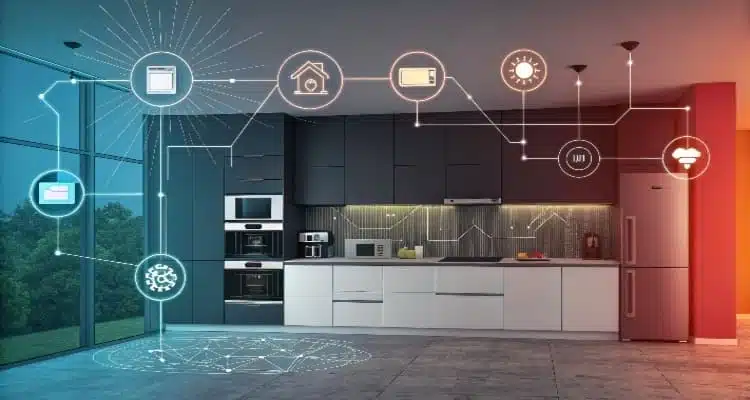










_ # **The Pros and Cons of Smart Appliances** Smart appliances are making waves in the tech world, and it’s no wonder—they promise convenience, efficiency, and even a bit of futuristic flair. But are they worth the hype? Whether you’re considering a smart fridge, a robotic vacuum, or a voice-controlled coffee maker, it’s crucial to weigh the benefits and drawbacks before jumping in. Let’s dive into the pros and cons of these high-tech household helpers. --- ### **Meta Title** Are Smart Appliances Worth It? Pros and Cons to Consider ### **Meta Description** Explore the pros and cons of smart appliances. Discover how they can simplify life, improve efficiency, and the potential challenges they bring. --- ## **Table of Contents** | **Sr#** | **Headings** | |---------|----------------------------------------| | 1 | **Introduction: What Are Smart Appliances?** | | 2 | **The Pros of Smart Appliances** | | 3 | **Energy Efficiency and Sustainability** | | 4 | **Convenience and Time-Saving Features** | | 5 | **Improved Home Safety** | | 6 | **Seamless Integration with Smart Ecosystems** | | 7 | **The Cons of Smart Appliances** | | 8 | **High Upfront Costs** | | 9 | **Potential Privacy and Security Concerns** | | 10 | **Maintenance and Software Updates** | | 11 | **Reliance on Internet Connectivity** | | 12 | **Are Smart Appliances Worth It?** | | 13 | **Tips for Choosing the Right Smart Appliance** | | 14 | **Future Trends in Smart Appliances** | | 15 | **Conclusion** | | 16 | **FAQs** | --- ## **1. Introduction: What Are Smart Appliances?** Smart appliances are the next generation of household devices equipped with internet connectivity and advanced features. They can be controlled remotely via apps, voice assistants like Alexa or Google Assistant, and even artificial intelligence. From refrigerators that can create shopping lists to ovens that suggest recipes, these devices are designed to make life easier. But with all their futuristic perks, are they always the right choice? Let’s explore both sides of the coin. --- ## **2. The Pros of Smart Appliances** When it comes to smart appliances, the benefits are plenty. Here are the major advantages: ### **3. Energy Efficiency and Sustainability** Did you know that smart appliances can help you save on energy bills? Many come with energy-efficient settings, learning algorithms, and the ability to operate during off-peak hours. For example, a smart thermostat can optimize your home’s heating and cooling, cutting down unnecessary energy use. By reducing waste and lowering consumption, smart appliances also support a more sustainable lifestyle. Who wouldn’t want to save money while helping the planet? --- ### **4. Convenience and Time-Saving Features** Life is busy, and every second counts. Smart appliances are here to give you some of that time back. Imagine preheating your oven on your way home or asking your smart fridge what’s inside without opening the door. These devices often learn your habits, making them even more helpful over time. For instance, a smart coffee maker can brew your favorite cup as soon as your alarm goes off. It’s like having a personal assistant in your home! --- ### **5. Improved Home Safety** Smart appliances can enhance home safety in ways you might not expect. Smart smoke detectors, for instance, can send alerts to your phone if there’s a fire, even when you’re not at home. Similarly, smart locks and cameras integrate seamlessly with other smart appliances, creating a comprehensive safety network. A smart oven can even turn itself off if left on for too long, reducing the risk of accidents. --- ### **6. Seamless Integration with Smart Ecosystems** If you’re already using smart devices, adding smart appliances to your home can elevate the experience. Many smart appliances sync with voice assistants or home hubs, enabling you to control them with a single command. Picture this: You say, “Goodnight,” and your home locks the doors, dims the lights, adjusts the thermostat, and powers down unnecessary appliances. That’s the magic of integration. --- ## **7. The Cons of Smart Appliances** As amazing as smart appliances are, they’re not without their downsides. Let’s take a closer look at the potential challenges. ### **8. High Upfront Costs** One of the biggest hurdles is the price tag. Smart appliances can cost significantly more than their traditional counterparts. While they often save money in the long run, the initial investment can be daunting. For example, a regular microwave might cost $100, but a smart microwave could set you back $300 or more. Is the added convenience worth the price? That depends on your priorities. --- ### **9. Potential Privacy and Security Concerns** With great technology comes great responsibility—and risks. Smart appliances collect data to function efficiently, but this can raise privacy concerns. There’s always the possibility of hacking or unauthorized access to your devices. Imagine someone gaining control of your smart lock or accessing personal data stored in your devices. Ensuring robust security settings is a must. --- ### **10. Maintenance and Software Updates** Smart appliances run on software, which means they require regular updates to stay functional and secure. However, not all manufacturers provide long-term support, leaving your devices vulnerable to bugs and glitches. Moreover, software issues can render your appliance temporarily useless, adding an extra layer of frustration to everyday life. --- ### **11. Reliance on Internet Connectivity** Smart appliances thrive on internet connections. If your Wi-Fi goes down, so do many of your appliances’ advanced features. While most devices have basic offline functionality, you lose the “smart” aspect without connectivity. This can be a dealbreaker for some users, especially in areas with unstable internet. --- ## **12. Are Smart Appliances Worth It?** The answer depends on your needs, budget, and lifestyle. If you value convenience, energy efficiency, and integration, they might be a game-changer for you. However, if you’re concerned about costs or security, you may want to stick with traditional options—or do a mix of both. --- ## **13. Tips for Choosing the Right Smart Appliance** 1. **Define Your Needs:** Focus on appliances that solve specific pain points in your home. 2. **Set a Budget:** Determine how much you’re willing to spend and prioritize accordingly. 3. **Check Compatibility:** Ensure the device integrates with your existing smart ecosystem. 4. **Read Reviews:** Look for real user experiences to gauge reliability. 5. **Verify Security Features:** Opt for appliances with robust privacy settings. --- ## **14. Future Trends in Smart Appliances** The future looks bright for smart appliances. Expect innovations like self-repairing devices, deeper AI integration, and even more sustainable options. As technology evolves, so will the capabilities of these gadgets, making them even more indispensable. --- ## **15. Conclusion** Smart appliances are transforming how we live, offering incredible benefits alongside some notable challenges. By understanding their pros and cons, you can make informed decisions that align with your lifestyle. --- ## **16. FAQs** **1. What are some examples of smart appliances?** Smart refrigerators, ovens, dishwashers, robotic vacuums, and thermostats are popular examples. **2. Do smart appliances save money?** Yes, many smart appliances save energy, which can lower utility bills over time. **3. Are smart appliances safe?** While generally safe, users should ensure secure passwords and regular software updates to minimize risks. **4. Can smart appliances work without Wi-Fi?** Some features may work offline, but many advanced functionalities require internet connectivity. **5. Are smart appliances worth the investment?** It depends on your lifestyle and needs. They’re ideal for tech-savvy users seeking convenience and efficiency.](https://kitchengadgetsinsider.com/wp-content/uploads/2024/11/what-are-the-pros-and-cons-of-smart-appliances-1024x683.png)
